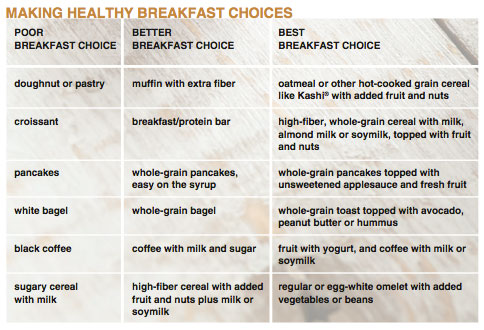Eating a Better Breakfast
Fitness Handout
 The alarm rings and you press “snooze” one time too many. By the time you roll out of bed, you think it’s too late for breakfast so you don’t eat. While some people do skip breakfast on a regular basis, it’s not a good idea. The potential perils include a more sluggish metabolism as the body shifts into starvation-response mode. Couple this with a tendency to become ravenous and binge later, and weight gain can happen. Cognitive abilities can also suffer: You may get headaches, feel fatigued and be less able to concentrate.
The alarm rings and you press “snooze” one time too many. By the time you roll out of bed, you think it’s too late for breakfast so you don’t eat. While some people do skip breakfast on a regular basis, it’s not a good idea. The potential perils include a more sluggish metabolism as the body shifts into starvation-response mode. Couple this with a tendency to become ravenous and binge later, and weight gain can happen. Cognitive abilities can also suffer: You may get headaches, feel fatigued and be less able to concentrate.
Learn how a lack of breakfast can impact exercise and what kinds of foods will give you the energy you need for the day from Martica Heaner, PhD, MA, MEd, NASM-certified trainer, award-winning group fitness instructor, and adjunct assistant professor of nutrition at Hunter College in New York City.
Exercise and Skipping Breakfast
Some people believe that by exercising on an empty stomach in the morning, they’ll burn more body fat. However, if the body burns a higher percentage of fat while exercising on no breakfast in the morning (and study results are mixed), that doesn’t mean metabolism—or total calorie burn—is speeding up. “If you’re going to do a long or strenuous workout on an empty stomach, you may not have adequate carbs to power your workout and so you won’t be able to work out as long or as hard,” says Enette Larson-Meyer, PhD, RD, FACSM, nutrition professor at the University of Wyoming and author of Vegetarian Sports Nutrition (Human Kinetics 2007). “Even if you are burning a slightly higher ratio of fat, with impaired performance you may not be burning as many total calories or total calories of fat as you could if you were well-fueled.”
What Counts as Breakfast?
“Usually we aim for breakfast providing 25%–30% of the calories for the day, so the amount will depend on a person’s daily energy expenditure,” says Larson-Meyer. Ideally, the morning meal should provide carbohydrates and fiber from fruits, vegetables and/or beans, as well as protein from dairy or, better, from plant-based varieties of milk or yogurt, as well as eggs or plant foods like beans and whole grains. While fruit is generally recommended over juice because fruit contains more fiber and fewer calories, a lean exerciser need not fear juice. “Most people should avoid drinking their calories, but if juice is an easy energy source before your workout in the morning, go ahead and drink it,” Larson-Meyer says.
What about doughnuts or pastries? “Something is better than nothing, and if you’re in the woods starving, a doughnut is okay,” says Melinda Manore, PhD, RD, nutrition professor at Oregon State University, Corvallis, and author of several textbooks, including Nutrition for Life (Benjamin Cummings 2006). But keeping a stash of easy breakfast backups, like breakfast bars, nuts or even cold leftovers, can give you more nutritious choices so that you’re not just filling up on empty calories. Don’t be afraid to get creative: Some cultures eat soups for breakfast, others eat beans (on toast or in bean burritos). Aim for a breakfast that provides energy and nutrients and that helps you feel satiated.


